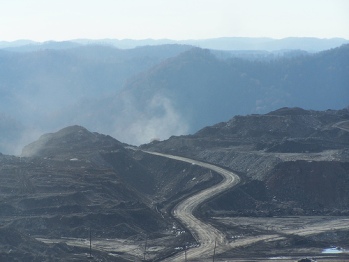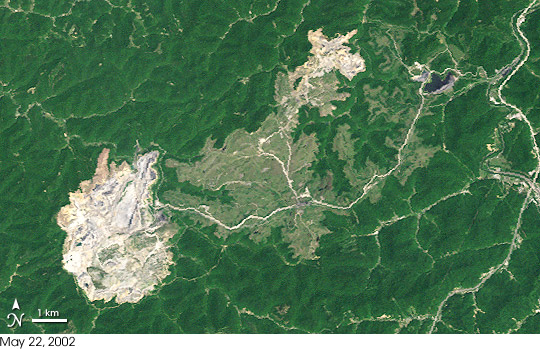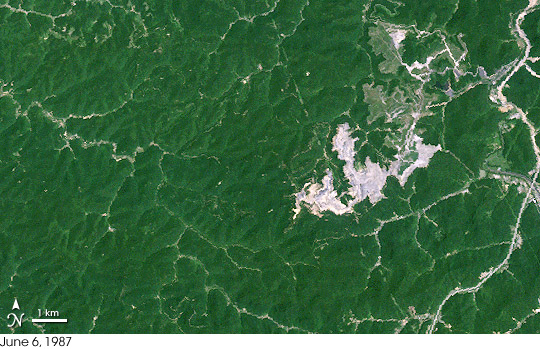A group of scientists have called for the Obama Administration to place a moratorium on infamous mountain top mining due to “growing scientific evidence” of severe environmental degradation and serious impacts on human health, including cancer.
The article, published in Science, is written by a dozen influential scientists, including hydrologists, ecologists, and engineers.
“The scientific evidence of the severe environmental and human impacts from mountaintop mining is strong and irrefutable,” lead author Dr. Margaret Palmer of the University of Maryland Center for Environmental Science says in a press release. “Its impacts are pervasive and long lasting and there is no evidence that any mitigation practices successfully reverse the damage it causes.”
 Mountaintop removal mining site. Photo by: JW Randolph. |
To reach coal for energy-use, mountaintop mining clears vast deciduous forests off mountains, strips away the topsoil, and then employs explosives to reach coal deposits beneath hard rock.
The authors write that “the extensive tracts of deciduous forests destroyed by [mountain top mining and valley filling] support some of the highest biodiversity in North America, including several endangered species.”
After the coal is reached, the blasted rock is pushed into adjacent valleys, burying and polluting streams. The contaminants filling the streams are able to travel long-distances through the steams, polluting important watersheds.
“The chemicals released into streams from valley fills contain a variety of ions and trace metals which are toxic or debilitating for many organisms, which explains why biodiversity is reduced below valley fills,” says co-author Dr. Emily Bernhardt, of Duke University.
Reclamation efforts have proven unable to bring back forests to their natural state according to the scientists: “many reclaimed areas show little or no regrowth of woody vegetation and minimal carbon storage even after 15 years.
Not surprisingly the practice of mountaintop mining has severe health impacts on local communities, according to the scientists. Coal communities in the Appalachian region—where most of the mountaintop removal mining is taking place—have high rates of lung cancer, mortality, and chronic heart, lung, and kidney disease.

|
The scientists conclude that “mining permits are being issued despite the preponderance of scientific evidence that impacts are pervasive and irreversible and that mitigation cannot compensate for losses. Considering environmental impacts of [mountain top mining/valley filling], in combination with evidence that the health of people living in surface-mining regions of the central Appalachians may be compromised by mining activities, we conclude that [mountain top mining/valley filling] permits should not be granted unless new methods can be subjected to rigorous peer-review and shown to remedy these problems.”
“Now more than ever, we need a 21st century approach to fulfilling our nation’s energy needs,” adds lead author Dr. Palmer. “No longer can we risk human and environmental health in our never-ending search for inexpensive energy. We need to move beyond filling valleys with mountaintop mining waste and temporarily storing fly ash in containment ponds to a modern energy production process built upon sound science, environmental safety and economic common sense.”
Palmer told Ken Ward Jr. of Coal Tatoo that the paper was not funded by any advocacy group, and Ward writes that the paper “underwent the most rigorous peer review by Science that they had ever seen”.
Burning coal for energy-use is one of the world’s largest sources of carbon dioxide leading to global climate change. Coal releases more carbon per unit than petroleum and natural gas.
The Obama Administration has pledged to make decisions based on sound science. At a press conference today regarding the peer-reviewed paper, head author Palmer said, “It is our hope that this will provide the science that the administration needs.”
Citation: M. A. Palmer, E. S. Bernhardt, W. H. Schlesinger, K. N. Eshleman, E. Foufoula-Georgiou, M. S. Hendryx, A. D. Lemly, G. E. Likens, O. L. Loucks, M. E. Power, P. S. White, P. R. Wilcock. Mountaintop Mining Consequences. Science, Volume 327, January 8th, 2010. doi: 10.1126/science.1180543.
Related articles
US subsidies of oil and coal more than double the subsidies of renewable energy
(09/21/2009) During the fiscal years of 2002-2008 the United States handed out subsidies to fossil fuel industries to a tune of 72 billion dollars, while renewable energy subsidies, during the same period, reached 29 billion dollars.
Environmental disappointments under Obama
(08/24/2009) While the President has been bogged down for the last couple months in an increasingly histrionic health-care debate-which has devolved so far into ridiculousness that one doesn’t know whether to laugh or cry-environmental decisions, mostly from the President’s appointees have still been coming fast and furious. However, while the administration started out pouring sunshine on the environment (after years of obfuscated drudgery under the Bush administration), they soon began to move away from truly progressive decisions on the environment and into the recognizable territory of playing it safe-and sometimes even stupid.
(07/30/2009) The U.S. coal sector will need to cut production 50 million tons this year due to falling demand, reports The Wall Street Journal. The cuts come in addition to even larger reductions earlier in the year.
Canada and Britain abandon conventional coal
(04/29/2009) In an effort to curb climate change, both Britain and Canada have announced plans to stop building new conventional coal power plants, a move long-advocated by environmentalists. Both nations have turned their sights to the possibility of clean coal, a controversial and still unproven method that has divided environmentalists, scientists, and policy makers.
Wind energy jobs now exceed coal mining jobs
(02/01/2009) Wind industry jobs now outnumber those in coal mining, reports CNNMoney.
Al Gore calls for “civil disobedience” against new coal plants
(09/28/2008) Former Vice President and Nobel Prize winner, Al Gore, told the audience at the Clinton Global Initiative that the moment had arrived for civil disobedience against new coal plants.
Clean coal is a vital energy source for the future says MIT report
(03/14/2007) Coal is a cheap and widely available energy source that will be continue to be used in the future despite its impact on global climate. For this reason, says a new report by MIT, it is essential to develop cleaner technologies for harnessing coal.








